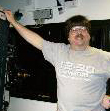|
|
 
|
|
Author
|
Topic: The END of the movie theatre???
|
Eric Hooper
Jedi Master Film Handler

Posts: 532
From: Fort Worth, TX, USA
Registered: May 2003
|
 posted 11-27-2003 12:25 PM
posted 11-27-2003 12:25 PM




http://sfgate.com/cgi-bin/article.cgi?f=/c/a/2003/11/27/BUGPF3AMPL1.DTL
Holiday trek to the movieplex? How quaint
Home theater, DVD technology combine to put big screens in peril
Tom Abate, Chronicle Staff Writer Thursday, November 27, 2003
--------------------------------------------------------------------------------
If this holiday is like Thanksgivings past, millions of Americans will take a break from shopping and slip into darkened movie theaters to lose themselves in the fantasy of the big screen.
"Thanksgiving is a time when families are looking for something to do over a long weekend,'' said Paul Degarabedian of the Exhibitor Relations Co. in Los Angeles, which tracks box office sales.
As one of the four big release dates -- along with Memorial Day, Christmas and New Year's Day -- Thanksgiving week can draw 40 million Americans into theaters, far exceeding the average weekly attendance of 25 million to 30 million, he said.
Impressive as those numbers may sound, the theater industry will sell fewer tickets during this peak week than it did during any seven-day period in the 1920s -- when the U.S. population was just a third of what it is today.
For discerning moviegoers, however, the real story this Thanksgiving isn't what's on the screen. Rather it's the changing nature of the $9 billion theater industry, whose biggest box office days are in the past, and whose future is uncertain in an age of DVDs, 24-hour cable and high-definition television.
Philip Harris, chairman of the California and Nevada chapter of the National Association of Theater Owners, stated the challenge facing movie houses, which are stuck in the middle, showing Hollywood films to the public.
"It's a different world today, there's so much more to occupy people,'' said Harris, who traces his industry pedigree back to his grandfather, who opened a movie house in San Francisco more than 60 years ago.
"In the 1940s, virtually every person who was old enough to walk and talk went to movies once a week,'' he said. "It was the way the average person was entertained.''
Harris presides over Signature Theaters, a San Ramon chain that operates 31 theaters in 19 cities. In all, that is 284 screens, which makes Signature about the 20th-largest national chain in an industry dominated by large companies that use the number of the screens they can offer as leverage in bargaining with Hollywood production houses.
Interviews with Harris and other theater insiders reveal two trends that define the industry -- and the moviegoing experience -- as it is today: an explosion in the number of screens per theater and a decline in the number of eyeballs per screen.
For instance, from the Roaring Twenties through World War II, the typical theater had a single screen, which it kept busy showing films and newsreels that offered pre-TV Americans their only glimpse of the real and imagined wonders of the world.
"Attendance was huge during the Depression because, for a relatively cheap price, you could escape the woes of the day,'' said Degarabedian, the box office watcher. "Theaters used to run nonstop, 24 hours a day.''
The 1965 edition of the Film Daily Year Book reveals that in 1922, when the U.S. population was about 106 million, the theater industry sold an average of 40 million tickets per week.
Average weekly attendance peaked at 90 million in the late 1940s, when the U.S. population was about half of what it is today. Then, in the 1950s came television, and theater attendance began to plunge. By the 1960s, weekly ticket sales were below Depression-era levels.
Harold Vogel, who teaches entertainment economics at Columbia University, said attendance bottomed out around 1971, when an average of 16 million tickets were sold per week.
To meet the challenges of those times, theater owners developed multiscreen theaters that could offer two, four or six different movies at the same time.
"It was much more economical,'' Los Angeles theater industry insider Milt Moritz said. "If you put a picture into the single-screen theater and you have to show it for six weeks, it can be very costly if the picture doesn't hold the audience.''
Over time, theater industry chains, offering multiscreen theaters, replaced small, single-screen operations. Today the industry is dominated by large chains -- circuits in movie lingo. The largest is Regal Entertainment, a Tennessee firm that operates 6,124 screens at 513 theaters.
Consolidation helped big theater owners gain leverage over Hollywood producers in a tug-of-war that affects everything about the movies from the price of a ticket to the cost of popcorn. San Francisco film industry consultant Gary Meyer said that in the opening days of a new film, 70 to 80 percent of the ticket price goes to the studio.
"That's why we operate the concessions,'' said Meyer, using candy and popcorn sales to offset low initial ticket revenues.
In 1995, when average weekly attendance was about 24 million, the industry began an evolution from the multiplex, with a handful of screens per theater, to the megaplex, with an average of 14 screens per location.
Quickly, the number of screens nationwide soared 34 percent, from 27,843 in 1995 to 37,185 in 1999. But average weekly attendance grew less than half as fast, rising 16 percent to 28.2 million.
"The industry overbuilt, and almost every movie chain of any size went bankrupt,'' Vogel said.
One chain that avoided the pitfalls of bankruptcy and emerged from this period as the nation's seventh-largest is Century Theaters of San Rafael. Founded in 1941 by Lebanese immigrant Raymond Syufy (sigh-Uh-fee), who started with a single theater in Vallejo, the chain passed to his sons, Raymond and Joseph, in 1995. During the past several years they have built the privately owned firm into a 900-screen giant with theaters in 11 states and a commanding presence in Northern California.
As the Bay Area's de facto industry leader, Raymond Syufy, 41, addressed two of the public's favorite gripes: rising ticket prices and the practice of airing pre-show commercials.
Syufy said theater owners have raised prices to meet expenses ranging from workers' compensation insurance to the cost of building megaplexes -- where each screen can run anywhere from $750,000 to $1 million, according to some estimates.
"Today's theaters versus five to 10 years ago are much better, and these are expensive,'' he said.
And while patrons rail at $8 to $10 nighttime admissions, data collected by the theater owners' association suggests that the average ticket during the past 20 years has risen only a bit more than inflation.
For example, the average ticket in 2002 cost $5.80, after factoring in matinee and discount tickets. In 1982, the comparable number was $2.94, but adjusted for inflation that works out to $5.49, a difference of 31 cents.
But these averages don't dull the sticker shock of the family that buys several nighttime tickets for a new film. Even at those prices, Syufy argued that movies are a better deal than other family entertainments like ballgames or amusement parks.
But while he toes the industry line on prices, Syufy is against airing commercials, even if it means giving up potential revenue.
"If we start showing commercials and go that route, then we are blurring the line between the 500 cable channels at home and the experience we want people to have when they leave their homes,'' he said.
In a sentence, Syufy articulated the theater industry's $9 billion question -- can it continue luring people out of their living rooms when DVDs, big screen TVs and wall-shaking speakers can offer a theaterlike experience inside the cocoon?
Howard Suber, founding chair of UCLA's School of Theater, Film and Television, believes movie theaters may be fighting a losing battle.
"Most people don't want to get out of their houses for anything in American society anymore,'' said Suber, who lumps the moviegoing public into two groups: teenagers dying to get out of the house, and single people on hot dates. He foresees a day when film studios bypass theaters and release new movies via some form of pay-per-view.
"It's quite possible that within our lifetime the megaplex will go the way of the drive-in,'' he said.
That's a prognostication calculated to unnerve Hayward City Manager Jesus Armas. His downtown revitalization plan is predicated on signing up a developer to build a megaplex to draw people back to the urban core, giving nearby shops and restaurants an economic boost.
"I wonder if theaters have become the equivalent of town hall gathering places,'' said Armas, whose town has lost three smaller, older movie theaters.
Analyst Wade Holden, who tracks the industry for Kagan World Media in Carmel, said one proposal to keep theaters relevant involves converting their projectors from film to digital.
Holden said that for decades, producers who release new films have had to spend millions of dollars to make thousands of prints and deliver those canisters nationwide.
Switching to digital projection would cut costs and save time as well as make theaters venues for new forms of live entertainment, "like beaming in a Rolling Stones concert,'' Holden said.
But theater owners say neither they, nor ultimately their patrons, should pay the estimated $100,000-per-screen conversion cost, when Hollywood would be the prime beneficiary of any film-to-digital switch.
Indeed, theater owners see themselves as caught between moviegoers -- who gripe about prices, commercials, even sticky floors -- and moviemakers, who take most of the box office in a film's first few weeks, while producing titles with life expectancies measured, also, in weeks.
Still, the movie bug seems to infect theater owners for a lifetime, or longer. As Syufy, the second-generation film presenter said: "It's nice to offer a product that gives people a chance to disappear from their trials and tribulations.''
E-mail Tom Abate at tabate@sfchronicle.com.
| IP: Logged
|
|
|
|
|
|
Thomas Procyk
Phenomenal Film Handler

Posts: 1842
From: Royal Palm Beach, FL, USA
Registered: Feb 2002
|
 posted 11-27-2003 02:15 PM
posted 11-27-2003 02:15 PM




Part of the problem is that theaters aren't what they used to be in the 1920s-1940s. Going to the movies then meant planning, dressing up, going out... the whole experience. Now it's more like an assembley line, supermarket-style, of: "Pick your movie. Buy your ticket. Buy some snacks. Go watch it in #14 down the hall, up the stairs and around the corner in our 75-seat house, and GET OUT WHEN THE FIRST CREDIT HITS THE SCREEN!!!" But that's what happens when non-entertainment companies purchase theater chains, I guess.
Next is the release dates. Our sub-run theater did phenominal with X2, which we got just two months after the break and whose DVD release didn't come out till well after we dropped the print. Then you get something like Finding Nemo where they sit on it for weeks while it's in limbo, out of the first runs but not in the second runs. Then you get your bookings right around the time the commercials for the DVD release start to air on TV. Of course people aren't going to go out to see it.
=TMP=
| IP: Logged
|
|
|
|
|
|
|
|
|
|
|
|
|
|
|
|
|
|
|
|
|
|
|
|
|
|
All times are Central (GMT -6:00)
|
|
Powered by Infopop Corporation
UBB.classicTM
6.3.1.2
The Film-Tech Forums are designed for various members related to the cinema industry to express their opinions, viewpoints and testimonials on various products, services and events based upon speculation, personal knowledge and factual information through use, therefore all views represented here allow no liability upon the publishers of this web site and the owners of said views assume no liability for any ill will resulting from these postings. The posts made here are for educational as well as entertainment purposes and as such anyone viewing this portion of the website must accept these views as statements of the author of that opinion
and agrees to release the authors from any and all liability.
|

 Home
Home
 Products
Products
 Store
Store
 Forum
Forum
 Warehouse
Warehouse
 Contact Us
Contact Us




 Printer-friendly view of this topic
Printer-friendly view of this topic














![[Frown]](frown.gif)







